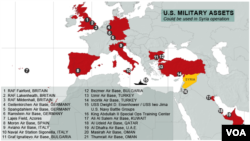WASHINGTON —
A U.S. attack against Syria could have unintended consequences and may not deter Syrian President Bashar al-Assad, some Middle East analysts say.
The cruise missiles are ready. The targets are being identified.
President Barack Obama is making the case for a U.S. attack.
“It is limited. It does not involve boots on the ground. This is not Iraq and this is not Afghanistan,” said Obama.
But analysts say Syria's military can withstand a limited strike. Some analysts are concerned that anything short of a robust attack may not deter Damascus.
Syrian analyst Elizabeth O’Bagy said, "If there is not an adequate response to the use of chemical weapons, it is very likely that he will continue to use them.”
Obama's decision to seek Congressional approval has delayed any attack, reportedly allowing Syrian President Bashar al-Assad to move troops and military equipment to civilian areas.
Former CIA officer and Middle East specialist Reuel Marc Gerecht said, “I would imagine that the Syrians, since they have had so much time, have taken their materiel [the French term for military equipment] and put it in places that are not easily hit by a cruise missile. It would require fighter bombers to do that.”
And U.S. warplanes may be in the mix. An aircraft carrier is now within striking distance of Damascus.
Syrian opposition groups are concerned limited strikes will not tip the balance on the battlefield.
Khaled Saleh of the Syrian National Coalition wants regime change.
“It is time to move the power from the family, the mafia that controlled Syria for the last 40 years. Now it is time to move that power into the hands of the Syrian people,” said Saleh.
With Western warnings about its controversial nuclear program, Iran, too, is watching.
“If we do not do something in Syria, I think the odds of the Iranians taking us seriously are zero,” said Gerecht.
Polls show many war-weary Americans are opposed to involvement in Syria’s civil war.
The president also has an uphill battle convincing Congress.
Senior analyst Michael O’Hanlon is more optimistic. “In the end, I don’t believe the administration is going to get a lot of flak from the American public, from the Congress, or from the allies. On the other hand, if they miscalculate or something goes wrong, all bets are off.”
On Tuesday night Obama will address the American people, while the war in Syria grinds on.
The cruise missiles are ready. The targets are being identified.
President Barack Obama is making the case for a U.S. attack.
“It is limited. It does not involve boots on the ground. This is not Iraq and this is not Afghanistan,” said Obama.
But analysts say Syria's military can withstand a limited strike. Some analysts are concerned that anything short of a robust attack may not deter Damascus.
Syrian analyst Elizabeth O’Bagy said, "If there is not an adequate response to the use of chemical weapons, it is very likely that he will continue to use them.”
Obama's decision to seek Congressional approval has delayed any attack, reportedly allowing Syrian President Bashar al-Assad to move troops and military equipment to civilian areas.
Former CIA officer and Middle East specialist Reuel Marc Gerecht said, “I would imagine that the Syrians, since they have had so much time, have taken their materiel [the French term for military equipment] and put it in places that are not easily hit by a cruise missile. It would require fighter bombers to do that.”
And U.S. warplanes may be in the mix. An aircraft carrier is now within striking distance of Damascus.
Syrian opposition groups are concerned limited strikes will not tip the balance on the battlefield.
Khaled Saleh of the Syrian National Coalition wants regime change.
“It is time to move the power from the family, the mafia that controlled Syria for the last 40 years. Now it is time to move that power into the hands of the Syrian people,” said Saleh.
With Western warnings about its controversial nuclear program, Iran, too, is watching.
“If we do not do something in Syria, I think the odds of the Iranians taking us seriously are zero,” said Gerecht.
Polls show many war-weary Americans are opposed to involvement in Syria’s civil war.
The president also has an uphill battle convincing Congress.
Senior analyst Michael O’Hanlon is more optimistic. “In the end, I don’t believe the administration is going to get a lot of flak from the American public, from the Congress, or from the allies. On the other hand, if they miscalculate or something goes wrong, all bets are off.”
On Tuesday night Obama will address the American people, while the war in Syria grinds on.







